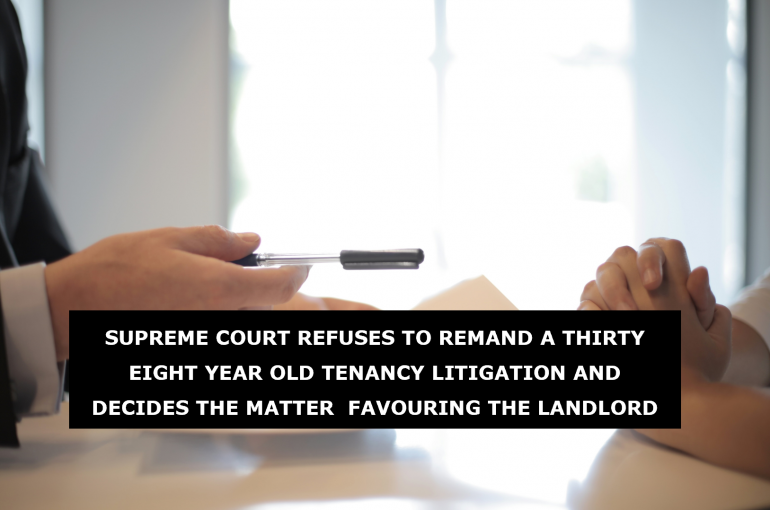SUPREME COURT REFUSES TO REMAND A THIRTY EIGHT YEAR OLD TENANCY LITIGATION AND DECIDES THE MATTER FAVOURING THE LANDLORD
A Two Judge Bench of the Supreme Court comprising of Justice Sanjay Kishan Kaul and Assanuddin Amanullah in CIVIL APPEAL NO. 4364 OF 2023 [Arising out of SLP(C) No.9434/2020] passed a Judgment dated 11-07-2023 in the matter RAVI KHANDELWAL (Appellant) vs. M/S. TALUKA STORES (Respondent) allowing an Appeal and directing the Respondent to deliver physical possession of the vacant tenanted premises at Jaipur, after illegally occupying the property for 38 years.
Facts:
i) The Appellant, purchased the suit property from M/s Jaipur Metal Electric Co. on 30-01-1985 which was occupied by tenants. The Appellant filed a suit before Additional Civil Judge and sought for the eviction of the tenant from the said premises on bona fide necessity. The Court dismissed the suit on 30-10-2002 on the ground that the plaint was not in accordance with Section 14(3)[i] of the Rajasthan Premises (Control of Rent and Eviction) Act, 1950 (hereinafter referred to as ‘the said Act’)
ii) In the first appeal, the Appellant succeeded before the Additional District Judge, Jaipur. The Court held that the shop was initially leased in 1958 and the suit cannot be said to be hit by the restriction in Section 14(3) of the said Act.
iii) On the second appeal, a Single Judge in High Court of Rajasthan framed a preliminary question on maintainability on 04-10-2018, and given the conflicting views on the interpretation of Section 14(3) of the said Act, referred the matter to a larger bench. The question of law framed for the larger bench was as under:
“Whether the limitation of five years specified in Section 14(3) of the Rajasthan Premises (Control of Rent and Eviction) Act, 1950 bars the institution of the suit itself or whether it has only the consideration of the suit and passing of a decree therein?”
iv) The Division Bench of the High Court by Order dated 20-04-2020 agreed with the former interpretation of the trial court, holding that there was no ambiguity in the language of Section 14(3) of the said Act, and Section 14 (3) created a complete bar to the filing of the suit.
Supreme Court Observations:
The matter went up in appeal to the Supreme Court where the apex Court held as follows:
1) The objective of this provision is to protect a tenant from the day when the tenant acquires a right, i.e right to continue in the premises for five years, subject to his fulfillment of the terms and conditions of the lease. This provision works as a shield for a tenant. However, the Bench said “What stares us in the face is that while the suit may have been defectively instituted within five years of the tenancy, more than 38 years have now elapsed since the suit was filed,”.
2) Further, the Hon’ble Court observed that “We opine that this passage of time beyond the period of five years would wash away the initial impediment against the suit. We cannot lose sight of the fact that we stare at a factual scenario where the vagaries of litigation have prolonged the suit proceedings for 38 years”.
3) The Hon’ble Court further observed that Respondent’s plea that the Appellant should be directed for a fresh filing was not acceptable. That the said plea was nothing but to prolong the proceedings. When the tenant has already prolonged the proceedings for 38 years then the same will continue in future if the said prayer is accepted.
4) Further, the Apex Court said we cannot accept such an interpretation which would defeat the very purpose of any provision which creates an initial restriction on filing of the suit. Further the Hon’ble Court observed that restarting a proceeding that had already taken 38 years, would be a travesty of justice.
5) Further, the Court held that “We may also take note of a subsequent development which is that the said Act itself has been abrogated in the year 2001, with a new statute coming into force, i.e. The Rajasthan Rent Control Act, 2001, which does not create any similar bar”.
6) The Court concluded that since so much time has passed, “it would be a mockery of justice to make the parties go through another round in the second appeal. Thus, we are of the view that a quietus should be put to this prolonged dispute spanning 38 years, on something as simple as a tenancy issue and as to when the proceedings commenced. We are also armed with the extraordinary power under Article 142 of the Constitution of India to do absolute justice inter se the parties”.
Conclusion:
Thus, the Supreme Court allowed the Appeal and refused to send back the matter as it observed that there was no question of law to be determined in the second appeal.
Editor’s Comments:
In India tenancy litigation stretch for years at an end. Very often the landlord passes away during the pendency of a litigation and the next generation has to fight the same. In most cases the landlords are stuck in tenancy agreements where the tenant is paying a very meagre rent and refuses to leave the premises. Possibly the only way there can be judicious settlement of such kinds of dispute is having fast track courts that can give quick relief to the landlord or the tenant.
[i] Section 14(3) of the Rajasthan Premises (Control of Rent and Eviction) Act, 1950:
“14. Restriction on eviction:- (3) Notwithstanding anything contained in any law or contract, no suit for eviction from the premises let out for commercial or business purposes shall lie against a tenant on the ground set forth in clause (h) of sub-section (1) of section 13 before the expiry of five years from the date the premises were let out to the tenant.”…
Sakshi Raghuvanshi
Associate
The Indian Lawyer
Edited by
Sushila Ram Varma
Chief Consultant
The Indian Lawyer





































Leave a Reply